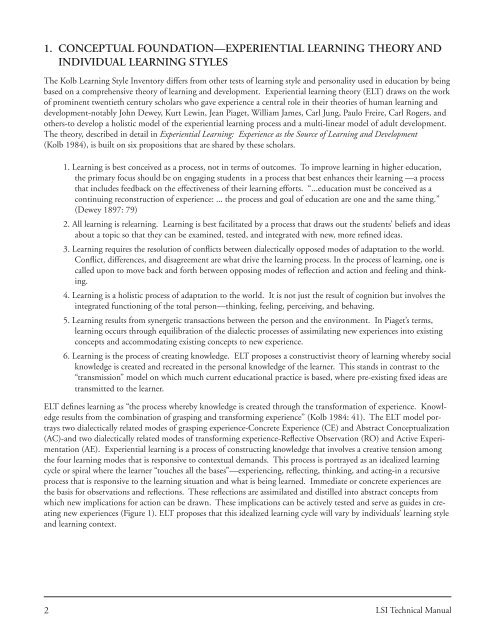The Kolb Learning Style Inventory—Version 3.1 2005 - Whitewater ...
The Kolb Learning Style Inventory—Version 3.1 2005 - Whitewater ...
The Kolb Learning Style Inventory—Version 3.1 2005 - Whitewater ...
Create successful ePaper yourself
Turn your PDF publications into a flip-book with our unique Google optimized e-Paper software.
1. CONCEPTUAL FOUNDATION—EXPERIENTIAL LEARNING THEORY AND<br />
INDIVIDUAL LEARNING STYLES<br />
<strong>The</strong> <strong>Kolb</strong> <strong>Learning</strong> <strong>Style</strong> Inventory differs from other tests of learning style and personality used in education by being<br />
based on a comprehensive theory of learning and development. Experiential learning theory (ELT) draws on the work<br />
of prominent twentieth century scholars who gave experience a central role in their theories of human learning and<br />
development-notably John Dewey, Kurt Lewin, Jean Piaget, William James, Carl Jung, Paulo Freire, Carl Rogers, and<br />
others-to develop a holistic model of the experiential learning process and a multi-linear model of adult development.<br />
<strong>The</strong> theory, described in detail in Experiential <strong>Learning</strong>: Experience as the Source of <strong>Learning</strong> and Development<br />
(<strong>Kolb</strong> 1984), is built on six propositions that are shared by these scholars.<br />
1. <strong>Learning</strong> is best conceived as a process, not in terms of outcomes. To improve learning in higher education,<br />
the primary focus should be on engaging students in a process that best enhances their learning —a process<br />
that includes feedback on the effectiveness of their learning efforts. “...education must be conceived as a<br />
continuing reconstruction of experience: ... the process and goal of education are one and the same thing.”<br />
(Dewey 1897: 79)<br />
2. All learning is relearning. <strong>Learning</strong> is best facilitated by a process that draws out the students’ beliefs and ideas<br />
about a topic so that they can be examined, tested, and integrated with new, more refi ned ideas.<br />
3. <strong>Learning</strong> requires the resolution of confl icts between dialectically opposed modes of adaptation to the world.<br />
Confl ict, differences, and disagreement are what drive the learning process. In the process of learning, one is<br />
called upon to move back and forth between opposing modes of refl ection and action and feeling and thinking.<br />
4. <strong>Learning</strong> is a holistic process of adaptation to the world. It is not just the result of cognition but involves the<br />
integrated functioning of the total person—thinking, feeling, perceiving, and behaving.<br />
5. <strong>Learning</strong> results from synergetic transactions between the person and the environment. In Piaget’s terms,<br />
learning occurs through equilibration of the dialectic processes of assimilating new experiences into existing<br />
concepts and accommodating existing concepts to new experience.<br />
6. <strong>Learning</strong> is the process of creating knowledge. ELT proposes a constructivist theory of learning whereby social<br />
knowledge is created and recreated in the personal knowledge of the learner. This stands in contrast to the<br />
“transmission” model on which much current educational practice is based, where pre-existing fi xed ideas are<br />
transmitted to the learner.<br />
ELT defi nes learning as “the process whereby knowledge is created through the transformation of experience. Knowledge<br />
results from the combination of grasping and transforming experience” (<strong>Kolb</strong> 1984: 41). <strong>The</strong> ELT model portrays<br />
two dialectically related modes of grasping experience-Concrete Experience (CE) and Abstract Conceptualization<br />
(AC)-and two dialectically related modes of transforming experience-Refl ective Observation (RO) and Active Experimentation<br />
(AE). Experiential learning is a process of constructing knowledge that involves a creative tension among<br />
the four learning modes that is responsive to contextual demands. This process is portrayed as an idealized learning<br />
cycle or spiral where the learner “touches all the bases”—experiencing, refl ecting, thinking, and acting-in a recursive<br />
process that is responsive to the learning situation and what is being learned. Immediate or concrete experiences are<br />
the basis for observations and refl ections. <strong>The</strong>se refl ections are assimilated and distilled into abstract concepts from<br />
which new implications for action can be drawn. <strong>The</strong>se implications can be actively tested and serve as guides in creating<br />
new experiences (Figure 1). ELT proposes that this idealized learning cycle will vary by individuals’ learning style<br />
and learning context.<br />
2 LSI Technical Manual


